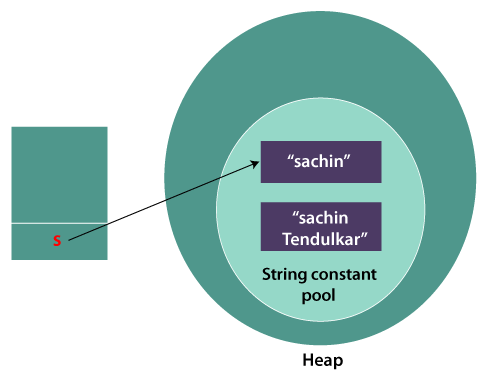What Is Immutable Strings and Just How It Works
In the world of programming, comprehending the idea of unalterable strings is vital for developing durable and safe and secure applications. Unalterable strings refer to strings that can not be modified after they are developed, ensuring information honesty and predictability within the code.
The Essentials of Unalterable Strings
Immutable strings, as a basic idea in shows, are personality series that can not be changed as soon as they are produced. This indicates that once a string is assigned a worth, that value can not be modified. In languages like Python and Java, strings are unalterable objects, causing various ramifications in regards to memory administration and data honesty.
One of the key advantages of immutable strings is that they offer a feeling of safety in information manipulation. Since the content of an immutable string can not be modified, it makes certain that the initial information stays intact, minimizing the risk of unintended modifications throughout program implementation (Why are strings immutable in Java?). This property likewise simplifies debugging procedures, as programmers can rely on that once a string is defined, its worth will not be unintentionally altered
When a brand-new string is produced based on an existing one, rather than customizing the initial string, the new value is kept independently. In general, understanding the fundamentals of immutable strings is important for grasping programs concepts and maximizing code performance.
Advantages of Unalterable Strings
Structure upon the security and performance benefits of immutable strings, their advantages prolong to boosting code integrity and streamlining simultaneous shows jobs. By being immutable, strings can not be changed after creation, which gets rid of the risk of unintended adjustments in the information they store. This inherent immutability ensures that once a string is created, its worth remains continuous throughout the program's execution, lowering the possibilities of insects brought on by unanticipated alterations.
In addition, immutable strings contribute to code reliability by making it less complicated to reason regarding the state of a program. Given that strings can not be changed, designers can trust that a string will constantly hold the exact same value, simplifying debugging and upkeep initiatives. This predictability causes a lot more stable and dependable codebases.
Application in Programming Languages
Within different programming languages, the consolidation of immutable strings is a basic element that influences how information is handled and manipulated within code frameworks. The application of unalterable strings differs throughout various programs languages, with each language supplying its very own systems to sustain this concept.

In comparison, languages like C and C++ do not have built-in assistance for immutable strings. Programmers in these languages need to by hand implement immutability by applying rules within their code to avoid straight modifications to string items.
Ideal Practices for Collaborating With Unalterable Strings
When dealing with immutable strings in programs languages like Java and Python, adhering to ideal practices makes sure reliable and safe and secure data adjustment. One of the essential finest practices is to utilize StringBuilder or StringBuffer rather than straight adjusting strings, particularly when taking care of considerable concatenation operations. These classes supply mutable choices for string adjustment, helping to avoid unneeded memory appropriations and boosting efficiency.
One more ideal practice is to use string interpolation or formatting works provided by the language rather of hand-operated concatenation. This not only enhances readability yet also help in avoiding common risks such as unintentional string modifications. Additionally, when dealing with sensitive information such as passwords or API secrets, it is essential to prevent saving them as simple message in immutable strings. Using safe storage space devices like char selections or specialized collections for dealing with sensitive information aids alleviate security threats related to unalterable strings.
Real-world Applications and Examples
Exploring practical implementations of unalterable strings in different industries discloses their considerable influence on data honesty and system integrity. In the health care field, unalterable strings play an essential function in ensuring the security and discretion of individual data. By stopping unapproved adjustments to delicate details such as medical documents and prescriptions, unalterable strings aid maintain conformity with stringent look here privacy policies like HIPAA.
Monetary establishments additionally gain from the immutable nature of strings to enhance the security of customer data and deal documents. Unalterable strings aid prevent scams and unapproved modifications to financial information, supplying a durable defense versus cyber dangers and ensuring the count on and self-confidence of customers.
Verdict
Finally, unalterable strings are repaired and stable series of personalities that use advantages such as string safety and security and improved performance in shows. They are carried out in numerous programming languages to make certain data stability and safety and security. Best practices for functioning with unalterable strings include staying clear of straight modifications and utilizing approaches that return brand-new string things. Real-world applications of unalterable strings consist of data security, caching, and string adjustment tasks.
Immutable strings refer to strings that can not be changed after they are produced, making sure data stability and predictability within the code. When a brand-new string is created based on an existing one, rather than changing the initial string, the brand-new worth is check these guys out kept independently.In languages like Java and Python, strings are unalterable by default, suggesting that once a string my explanation object is created, its value can not be transformed - Why are strings immutable in Java?. Ideal methods for functioning with unalterable strings consist of preventing straight adjustments and using techniques that return new string objects. Real-world applications of immutable strings consist of data encryption, caching, and string control tasks